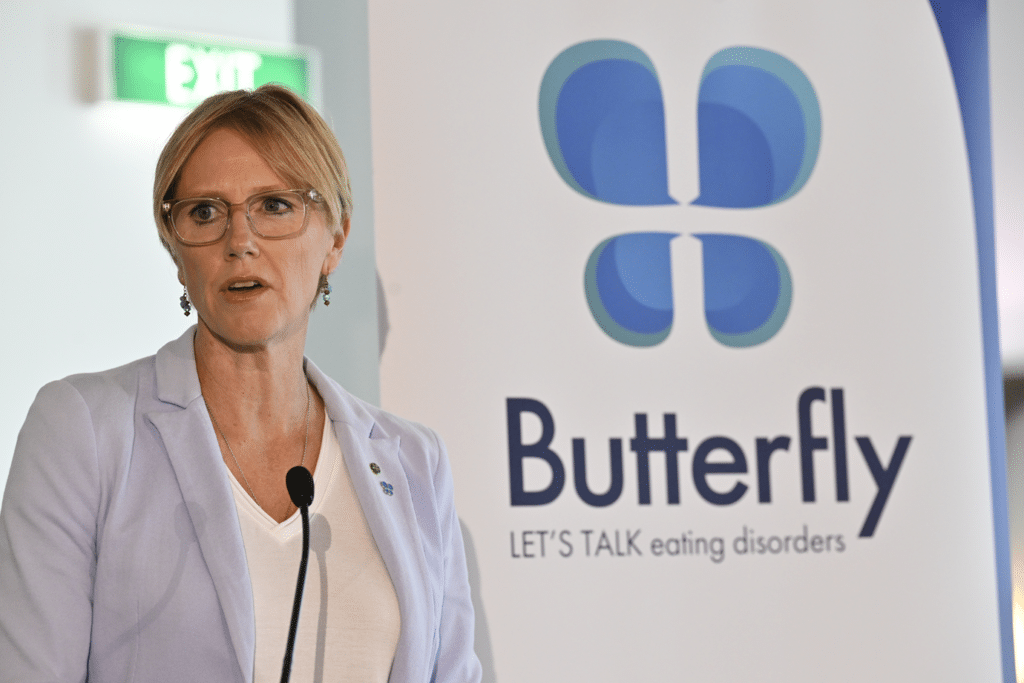A duty of care to young people and better accountability mechanisms for social media companies are among a number of urgent recommendations put forward to tackle rising body image issues and eating disorders among young people.
Twenty-one recommendations have been proposed by a working group of eating disorder experts, individuals with lived experience, and representatives from social media giant, Meta, in a bid to urge the government and social media companies to do more to keep young people safe online.
They were hosted in Parliament House on Tuesday by independent MP Zoe Daniel and the Butterfly Foundation.
It comes as new research shows almost two thirds of young people aged 12-18 say social media makes them feel dissatisfied with their body. This figure has risen by 12 per cent since 2022.
Since 2012, the prevalence of eating disorders in young people has risen by 86 per cent. And while there are a range of factors that contribute to the development of an eating disorder, body dissatisfaction is the highest modifiable risk factor.
Among the key recommendations from the roundtable is a call to modify the Online Safety (Basic Online Safety Expectations) Determination 2022 so that social media platforms must take “reasonable steps” to remove pro-eating disorder content and advertisements from their platforms, with fines and other punitive measures for inaction.
It also called for the amendment of the Online Safety Act 2021, so that there is an overarching duty of care to protect young people using social media platforms, along with more transparency and better accountability mechanisms.
Removing beauty filters inbuilt into social media platforms should also be be removed from children’s accounts, the rountable recommended, along with a requirement to prioritise the presentation of diverse physical appearances across platforms.
“Young people are dying of eating disorders, and online is where our kids live a lot of the time. We need to make sure these spaces are safe for them,” Daniel said.
“Where we need to get to is a duty of care on the platforms so that they take responsibility for what they deliver to people, rather than the responsibility being on the receivers of the material.
“In the meantime, there are things the government can do, and these recommendations provide legislative and policy options for them.”
Daniel said she will take the recommendations from the roundtable to the government and urge them to act.
CEO of Butterfly Foundation, Dr Jim Hungerford said eating disorders are a “hugely prevalent” issue in Australia.
“Our latest research showed 27 per cent of people in Australia living with an eating disorder are aged under 19 – a significant increase from 15 per cent in the last Paying the Price Report in 2012. While social media isn’t solely responsible for these figures growing, it certainly plays a part,” Dr Hungerford said.
“It’s time for the government to take action and start prioritising the mental health of young people in Australia by reforming policies and working closely with social media platforms and independent third parties. We’ve reached a critical juncture with this issue and have done everything we can within our communities, but we need further support.”
Social media is ‘a double-edged sword’
Varsha Yajman, a member of the roundtable and a young person with lived experience of an eating disorder said for her, social media had been a “double-edged sword”.
“My own experience as a woman of colour struggling with an eating disorder, searching for representation and help, has shown me the need for more support for those living with eating disorders and body image issues,” Yajman said.
“Social media has been a double-edged sword, telling us we have found a ‘community’ when in reality much of it has detrimentally affected our mental health – our feed filled with weight loss stories, dieting advice or the next best supplement to take, and it’s all consuming.
“To me and so many others, it is clear that social media negatively impacts perceptions of health and contributes to young people experiencing eating disorders – we feel there is no escape from this content. However, my hope is that the incredible work of our Roundtable over the last few months highlights this issue and leads to change.”
You can find the full list of recommendations from the rountable here.
Anyone needing support with eating disorders or body image issues is encouraged to contact:
Butterfly National Helpline on 1800 33 4673 (1800 ED HOPE) or [email protected]
Eating Disorders Victoria Helpline on 1300 550 23
For urgent support call Lifeline 13 11 14

